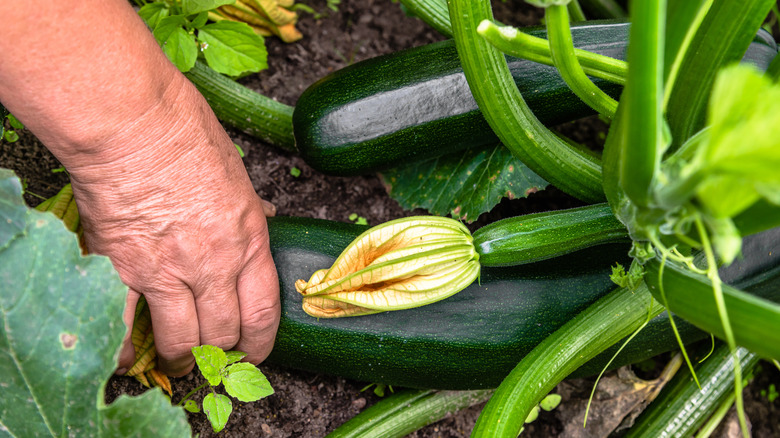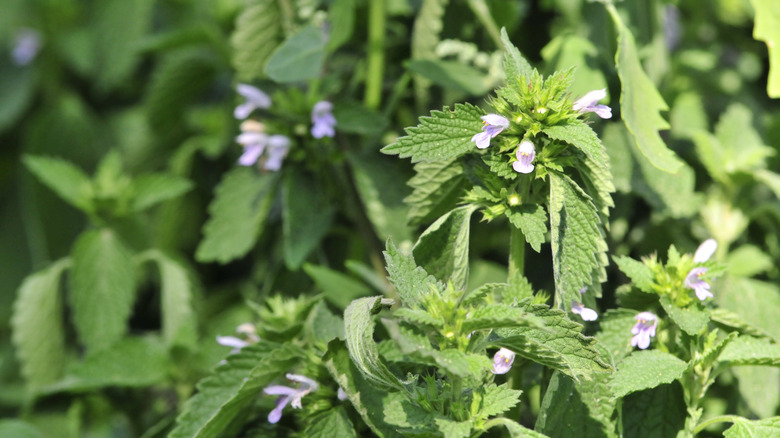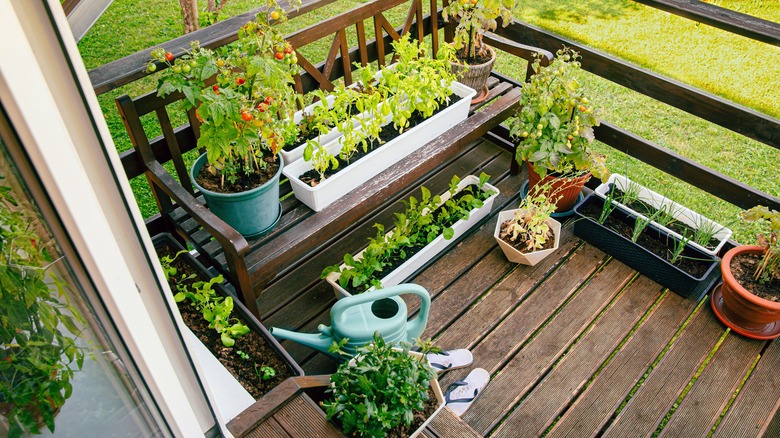The Lemon-Scented Herb That Thrives Next To Zucchini In The Garden
Zucchini, a versatile and herbaceous squash is praised by medical practitioners, nutritionists, and chefs alike. It's used for everything from moistening bread to offering low-calorie fiber. It's used in casseroles, salads, and side-dishes, and when prepared correctly, can even be used as a substitute for pasta. Also called courgette, zucchini is actually a fruit that's best when it's 8 inches long or less. Raw or cooked, all parts of the squash are edible. The showy bright orange flowers that appear on the plant before the squash are edible as well.
Zucchini is one of the easiest plants to cultivate, especially if you follow our tips and avoid these common mistakes. To generate the optimum amount of fresh squash, zucchini plants can use a little help with pollination, and that's where companion plants like lemon balm come in. This herb with distinctive crinkly leaves is a member of the mint family (look for its squared-off stems). With oval or heart-shaped leaves, lemon balm generates white flowers that are small in size but rich in nectar, making it an attractive plant to bees and butterflies. Planting such an alluring herb next to zucchini guarantees that the blooms on your squash will be visited by pollinators as well.
Pollination is key
Zucchini are monoecious, which means a single plant generates male flowers and also, usually a little later, female flowers. Your garden plant must have both kinds of flowers, and pollen has to transfer from the male to female flower in order to generate a squash or two. Usually bees, seeking nectar, bring pollen from the male to female flower, although some gardeners do this by hand with a small paint brush. The bottom line is that zucchini isn't very good at pollinating itself, so it relies on bumblebees and butterflies to help generate fruit. Having a companion plant like lemon balm, which pollinators love, will increase the probability of a bumper crop of squash.
You can grow zucchini in your garden from seed or by starting seeds indoors in peat pots that you transfer once the soils has warmed up. Plant in rich, moist, but well-drained soil in full sun. Keep the plants watered and the leaves clean from dirt. Lemon balm also prefers as much sun as you can give it, plus moist, well-drained soil as well. Pollinators will appreciate having a calm place to work, out of direct wind, if possible.
Creative options
If your garden is small, or even if you can only manage container gardening, you can still have your own zucchini/lemon balm combination. Zucchini plants in pots will train up along a trellis or sideways along a fence, and still produce the flowers needed to generate home-grown squash. Lemon balm can also be trained and pruned to have a smaller footprint that boosts the productivity of zucchini while emitting an attractive citrus-flavored scent. Like most mint relatives, lemon balm can spread rapidly over a fairly large area, but judicious pruning will keep the herb in check, producing flowers for pollinators. The balm's lovely, rounded leaves look and smell great when placed in a vase with cut flowers or even on their own.
Lemon balm has several uses independently too. As part of the mint family, scattering chopped leaves boosts the flavor of fresh fruit. Often the herb is used as a base for tea, noted for its ability to calm and soothe. It's also used topically in face creams and skin and lip moisturizers. Lemon balm is only one of several plants we've suggested as a companion plant for zucchini in your garden, so look into those too if you really want to maximize your courgette crop.


